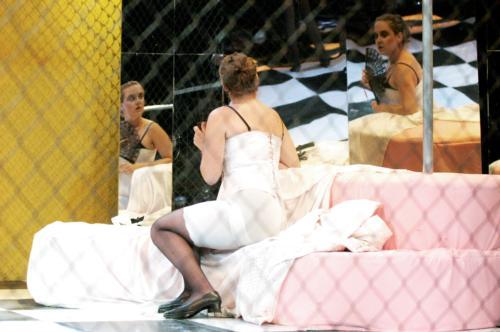
News
When Professors Speak Out, Some Students Stay Quiet. Can Harvard Keep Everyone Talking?

News
Allston Residents, Elected Officials Ask for More Benefits from Harvard’s 10-Year Plan

News
Nobel Laureate Claudia Goldin Warns of Federal Data Misuse at IOP Forum

News
Woman Rescued from Freezing Charles River, Transported to Hospital with Serious Injuries

News
Harvard Researchers Develop New Technology to Map Neural Connections
Burkle’s Revolution Ends in the Home

Walking into Harvard-Radcliffe Summer Theatre’s “The Maids,” I mentioned to the usher that some problems, in addition to the oppressive heat, had made my day heavy. When she replied that the play wasn’t going to help, I was taken a bit by surprise.
I know something of the work of French dramatist Jean Genet, whose plays are usually associated with Antonin Artaud’s theater of cruelty, and of the style of director Jess R. Burkle ’06, whose spring production, “Knock,” was lauded for its dark comedy. However, I wasn’t prepared for the abject violence of this new script, nor the calculation with which Burkle’s cast and crew approached it. It never lifted my spirits, but its intelligence and precision were overwhelming.
Which shouldn’t have been a shock. For a play that opened on Bastille Day, who better than a French writer to provide generous doses of existentialism, warped philosophy, and good ol’class struggle?
The play follows the sinister, sadomasochistic, and (almost literally) suffocating interactions of two maids, who yearn for freedom from the Ancien Régime, embodied by the tyrannical “Madame” (Laurel Holland ’07). Apart from revolutionary ideas, the Papin sisters—famous 1930s French murderers—inspired Genet, just as they did in the works of Sartre and Lacan.
Viewers who chose ignore the deep questions of the company’s earlier production, “Charlie Brown,” cannot do the same here. Darkness is ubiquitous. It fills each troubling monologue, each careful gesture, each overt physical action.
In these murky environs, Burkle and his actors shine. Though aesthetically, audiences might find the cage that dominates the set imposing at first, in short order, they’ll be grateful to have something—anything—between themselves and the ever-more-disturbing personalities on stage.
Claire (Rachel E. Flynn ’09) seemed overwrought during the play’s intense first minutes. However, as the work became deeper and darker, her young talent reached great heights in a twisted universe of moral lows. Her screeching requests for tea never became repetitive—only more disquieting.
Whether lurking in the background or delivering a careful monologue, Solange (Jennifer H. Rugani ’07) was powerfully expressive. The sisters’ interactions makes it impossible to judge which character is in the right; it’s a moral draw that only enhances the unsettling drama. She and Claire only became ancillary during Madame’s short but powerful appearance on stage.
The play sees slaves and masters contort the roles they normally take. However, “Maids” goes deeper that simply showing a character mix-up. Channeling Immanuel Kant, Genet shows how the maids’ oppression exists only with their permission; so long as they fight each other instead of Madame, they will remain in chains.
The actors’ adroit work is bolstered by a well-calculated set design: no prop, from TVs to teacups, is without purpose. The repetitive techno-remix score follows the same path, deliberately building tension—at least, when Madonna isn’t singing. However, the costumes are the production’s piece de resistance; to imagine the maids without them is to imagine Roxanne without her red dress.
Clearly, the usher was right: the only sweet and easy parts of the play were the M&Ms from the concession stand. “The Maids” might not have made my day easier, but it closed Burkle’s directorial career at Harvard on a high note. As in any existentialist voyage, the bumps in the road make the trip worth it: the maids’ games are a ticket to the darkest corners of the soul’s cage.
—Reviewer Pierpaolo Barbieri can be reached at barbier@fas.harvard.edu.
Want to keep up with breaking news? Subscribe to our email newsletter.
